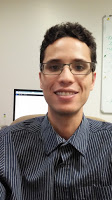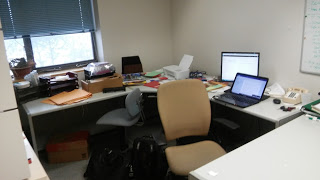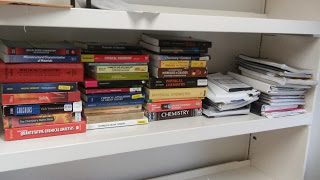I am Alexandre Pinto, and This is How I Work
 Today, I am interviewing Dr. Alexandre H. Pinto. Alex Pinto is currently a Post-Doctoral Teaching Fellow and Faculty Member at Ithaca College (Ithaca, NY), where he leads the group for Green Chemical Synthesis of Nanomaterials. Alex was born and raised in Brazil, where he took his undergraduate degree in Chemistry and Master’s degree in Physical Chemistry, both at Universidade Federal de Sao Carlos (UFSCar), advised by Prof. Emerson R. Camargo. After that, Alex moved to USA, where he took his PhD in Chemistry at University of Minnesota – Twin Cities, advised by Prof. R Lee Penn, working on the synthesis of transition metal chalcogenides using microwave assisted reactions. Throughout his career, Alex has worked with the solution chemistry synthesis of transition metal oxides, selenides, and sulfides, and characterization by different techniques, such as X-ray diffraction (XRD), Raman and Infrared Spectroscopies, Scanning and Transmission Electron Microscopy. Since joining Ithaca College, Alex has worked on the application of Green and Materials Chemistry concepts to solve environmental problems, such as remediation of wastewater contaminated by organic pollutants via photocatalysis and solid-liquid adsorption, and development of transition metal oxides for less expensive catalysis of organic reactions.
Today, I am interviewing Dr. Alexandre H. Pinto. Alex Pinto is currently a Post-Doctoral Teaching Fellow and Faculty Member at Ithaca College (Ithaca, NY), where he leads the group for Green Chemical Synthesis of Nanomaterials. Alex was born and raised in Brazil, where he took his undergraduate degree in Chemistry and Master’s degree in Physical Chemistry, both at Universidade Federal de Sao Carlos (UFSCar), advised by Prof. Emerson R. Camargo. After that, Alex moved to USA, where he took his PhD in Chemistry at University of Minnesota – Twin Cities, advised by Prof. R Lee Penn, working on the synthesis of transition metal chalcogenides using microwave assisted reactions. Throughout his career, Alex has worked with the solution chemistry synthesis of transition metal oxides, selenides, and sulfides, and characterization by different techniques, such as X-ray diffraction (XRD), Raman and Infrared Spectroscopies, Scanning and Transmission Electron Microscopy. Since joining Ithaca College, Alex has worked on the application of Green and Materials Chemistry concepts to solve environmental problems, such as remediation of wastewater contaminated by organic pollutants via photocatalysis and solid-liquid adsorption, and development of transition metal oxides for less expensive catalysis of organic reactions.
Current Job: The title of my current position is Post-Doctoral Teaching Fellow and Faculty Member, it is a position suited to provide teaching and research advisory experience in an undergraduate institution for recent PhD graduates aiming to pursue a career in undergraduate institutions.
Current Location: I am currently working in the Department of Chemistry at Ithaca College, which is located in the city of Ithaca, in the central part of the New York State.
Current Mobile Device: I own a LG Stylo phone with Android System, I have owned this cell phone since October 2015.
Current Computer: My current computer is a Toshiba Satellite, with an Intel Core I3 processor, 4 GB of RAM memory, and 500 GB hard drive and a Windows 10 operational system. This computer has been with me since Summer 2013. Sometimes it is a little bit slow, mainly when a new update of Microsoft Office or Windows is about to be released, but in overall, it has been fully functional.
Can you briefly explain your current situation and research to us?
As previously told, I am currently a Faculty Member at Ithaca College, where I teach generally three courses per semester. Generally, it is a lecture course and two lab courses per semester. Besides that, I manage a research group with undergraduate students. The goal of our research group is to synthesize nanomaterials using more sustainable, less toxic and harmful methods, which complies with a branch of chemistry called Green Chemistry. Then, we use these materials to solve some environmental problems, for instance, wastewater remediation. Talking more in depth, we are interested to study how textile dyes present in simulated wastewater interact with nanomaterials. Currently, we are working with two classes of materials, one of them is the polymer chitosan, which is produced from a material called chitin, found in skeleton of sea animals like crab and shrimp. The second material is the graphene oxide, which is a twodimensional material, very thin and with high surface area, mostly constituted by carbon. Besides our research in nanomaterials and Green Chemistry, we are also starting to do some research in Chemical Education, we are about to submit a paper about this topic, regarding the development and implementation of a course about characterization techniques for solid state materials.
What tools, apps and software are essential to your workflow?
Besides the regular Microsoft Office package, there are three softwares that I consider essential to perform my job. The first one is called Origin 2017, it is a graphical software, which allows to plot graphs with a publishable quality, and offers more features than Excel. Besides the capability to produce high quality graphs, Origin is essential for my work because it allows me to do curve and linear fitting, as a Materials Physical Chemist, those two features are very necessary to perform my data analysis. The other two essential softwares are used to image treatment, the interesting thing is that both of them are free softwares. One of them is called ImageJ, and the second one is called Gimp. I use ImageJ to adjust contrast, sharpness, and adjust scale bars for electron microscopy images, then, I move to Gimp to increase image resolution and do small adjustments. The great thing about ImageJ and Gimp is that both softwares are free.
What does your workspace setup look like?
The majority of the week I spend in my office at Ithaca College, preparing classes, reading papers, analyzing data and thinking about the next experiments, which you can see some pictures. Then the rest of the time is spent in the classroom, while I am teaching, and in the lab space, where I go few times per
week to perform some experiments by myself.
What is your best advice for productive academic work?
Be self-driven. Science is made of ideas, but ideas themselves do not translate in results. Most people who chose a scientific career, usually have a lot of ideas, either good or bad ones, but, in general, all of them are worthwhile. However, many ideas are never put in practice, and to put an idea in practice, I consider that the researcher needs to be self-driven, because there will be a lot of factors and people trying to demotivate you around this way. So, the researcher needs to find their inner strength, take the ownership of their idea, and do everything that is feasible to make it work.
How do you keep an overview of projects and tasks?
I do not have any sophisticated device for this purpose. I am still in the phase of my career that I rely a lot on my memory to remind me about appointments. One thing that I do routinely is to take a blank paper sheet when I first arrive in my office in the morning and write as bullet points all the tasks that I have to do for that day. Then, after I have completed a certain task, I cross that off the list. This simple action to cross the task of the list, although simple, gives kind of feeling of accomplishment.
About the research, I rely a lot on the lab notebook, and monthly or every other month, I gather the results obtained by the students or myself in a certain project and write a results outline, where I paste the graphs and briefly write how those results could be interpreted, and which are the remaining questions to be answered in order to make the project as close as possible to be a cohesive story, and hopefully become a paper manuscript. I feel these outlines very helpful when it is time to write a manuscript for a paper.
Besides phone and computer, do you use other technological tools in work and daily life?
No, I do not use any other technological tool besides laptop computer and cell phone in work and daily life. Also, by looking at how long I have owned my current laptop and cell phone, you might have noticed that I try to keep my devices for as long as they continue working. I am not the type of person interested to buy immediately the latest model of a computer or cell phone.
Which skill makes you stand out as an academic?
I have always worked hard in my academic life, and one thing that I consider that essential is preparation. So, I always have tried to be prepared for when a possible opportunity could show up. Besides that, take the initiative and propose ideas that people probably would not expect from you. In a positive and humble way, I can say that I am proud to be on this point of my career so far. When I look back and see that I was the first person in all sides of my family to obtain a College education, and now I am teaching and researching in the USA, and having my work recognized is something that shows how far education, preparation and dedication led me in my life and career. I think this is one of the reasons I like teaching and academic life in general, because in the academy is where knowledge is seen as worthwhile. And that is the reason why I hope to continue researching, teaching and somehow trying
to be a good example to the student generations that will come.
What do you listen to when you work?
I am the type of person that prefers the complete silence while doing something that requires attention. If I have something to listen, like song or video, I totally lose the concentration. So, when I am seriously studying I do not listen anything.
What are you currently reading? How do you find time for reading?
In this moment, I am not reading any book outside the scientific field, unfortunately. However, this is a habit that I intend to retake in a foreseeable future.
Are you more of an introvert or extrovert? How does this influence your working habits?
For sure I am an introvert, in all fields of my life and relationships, but I see any professional activity as an opportunity to leave my introvert side away. Surprisingly, I have never felt uncomfortable talking to audiences, like classes or conferences, actually, I greatly appreciate talking in public. I think this one of reasons why I like teaching and give oral presentations, it seems that in those situations I am the extrovert person that I think I would like to be in all other fields of my life. In summary, I would say that being an introvert does not influence much in my working habits, despite influencing in most of the other fields in my life.
What is your sleeping routine like?
I sleep about 5 to 6 hours per night, generally from 11 PM to 5:30 or 6:00 AM.
What is your routine work like?
I arrive in my office right before 8 AM, this semester most of classes I teach are in the morning. They start at 8 AM or 11 AM. When the class starts 11 AM, I can work in my research activities for a while. The afternoon is filled with either by class preparation, paper reading, writing, and experiment planning. I generally leave my office around 6 PM. Until last semester, I used to go to my office and work during the weekends. For this semester, I have done the commitment with myself to avoid as much as possible going to the College in the weekends, to spend more time with my family. I am happy that so far, I have accomplished this goal.
What’s the best advice you ever received?
This advice it was not given personally to me, but I heard it in a lecture more than 15 years ago, I was still in high-school that time, and to have heard this statement early in life made the difference in my professional career. The statement says: “Things like space, opportunity, and prestige will not be given to you. You have to conquest them.”


